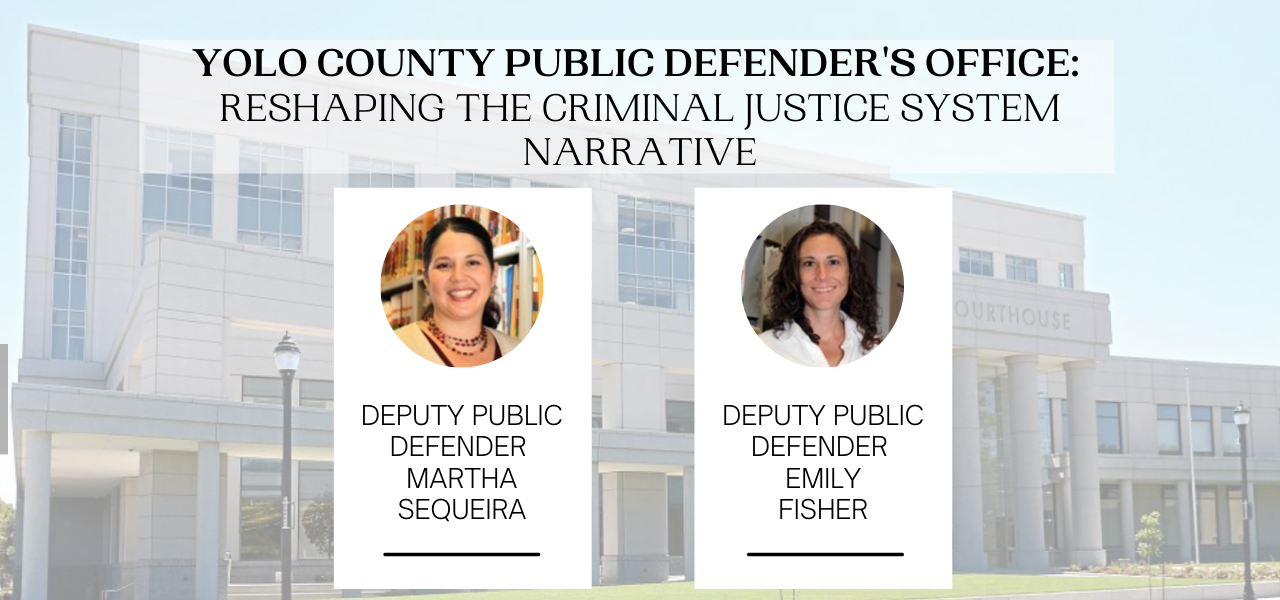

By Jordan Varney
DAVIS — On Feb. 22, the Vanguard hosted a webinar with two Yolo County deputy public defenders, Emily Fisher and Martha Sequeira. The deputy public defenders gave a presentation about how the narratives and priorities of the criminal justice system are dehumanizing.
Their talk consisted of three sections: what the current narratives and values of the criminal justice system seem to be, the perspectives that are overlooked with regards to the humanity of their clients and the questions that should be asked about the criminal justice system.
Fisher explained that there are four current narratives of the criminal justice system: deterrence, incapacitation, retribution and rehabilitation. She stated, “retribution really seems like the main thing we’re doing, punishing people.”
Fisher explained that for her it is important when she is in court to ask herself, “what goal are we really fulfilling in what we’re doing here?” and that “more often than not I’m at a loss to find what the actual goal is.”
One of the issues the speakers identified with the criminal justice system is an “us versus them mentality.”
“This seems to be a general narrative that people who are in trouble and end up in court are bad people,” Fisher explained, “and that’s why they’re there and that’s why they need to go to prison.” Fisher says she has to defend in court “why my client is not a bad person, because they’re not…it’s a narrative that doesn’t humanize our clients.”
“We don’t try to analyze where we as a community have failed each other in providing an environment where we can all flourish,” Sequeira stated. “Instead of doing that we assign blame.”
She expanded on her point saying, “We as a community are only as strong as our most vulnerable. Yet instead of trying to promote our most vulnerable, instead of trying to give people an equal playing field, we just assign blame. And I think it’s easier for people to assign blame and to put their heads in the sand than it is to take a strong look to where your community is failing to provide a platform for everybody to be successful.”
Sequeira explained that a lot of their clients are not in the system because they want to be. “A lot of people find themselves in our system because they lack hope, they lack options, they lack opportunities, they lack support, they lack education,” she explained.
“If our current narrative that we have now worked,” Fisher said, “we would see results.”
The public defenders went on to explain that a lot of people make money off the current criminal justice system. “It’s a business,” Sequeira said.
“There are hundreds of thousands of people who make very good livings,” she said. “It’s a benefit to all of the people who are making a profit off of supporting the narrative of putting people in cages.”
Fisher explained that the money being spent on their clients, “arresting them, caging them,” overlooks the fact that “people charged with crimes are human beings.”
“A criminal defendant is somebody’s mother, somebody’s father, somebody’s brother, sister, aunt, uncle, daughter, or son, you name it. They’re a member of our community.” Fisher stated. Sequeira went on to explain the trauma that communities experience when someone is in prison. “When you take away a mother from a family, you aren’t just penalizing the mother, you are hurting everybody that that woman takes care of, everybody that that woman loves.”
“We incarcerate them for no reason other than we can’t figure out how to help them before they get to this point.” Sequeira said. Two main circumstances that the public defenders identified for why people end up involved in the criminal justice system were poverty and mental health issues. “Our clients are poor. Our clients don’t have money and they don’t have resources and it does not make them any less of a human being.” Fisher said.
They displayed data from the California Budget and Policy Center that showed that more than one quarter of people incarcerated at the state level in California receive mental health care. “Until we start addressing what’s causing these issues and until we start giving people resources to become stable,” Sequeira said, “we are going to have people who have mental health problems in the community who continuously get put in cages.”
“We as a community should be ashamed, we should be embarrassed of the fact that that’s how we protect our most vulnerable” Sequeira stated.
The public defenders displayed information from the California Budget and Policy center that said “reducing mass incarceration of men and women can go hand-in-hand with lower crime rates.” “So what are we doing?” Fisher asked.
Fisher tied all the points together with questions that people should be asking themselves: “Why are we not focusing more as a community on how we can help each other with the goal of less crime rates and less people in cages? How did that person end up in the situation in the first place? What is putting them in a cage really going to do for them and for society as a whole?”
Sequeira concluded by talking about how restorative justice as a concept is “phenomenal.” She explained that she thought it would help “integrate people and change the narrative that people who commit crimes are bad people.”
“That is way more beneficial than putting somebody in a cage for three months because they took $10 worth of an item from Target,” she said. She also listed “wrap around services, early intervention, education” as other things communities could invest in. In general, “more funding back into our community” is “more helpful than spending money putting people in a cage.”

Jordan Varney received her masters from UC Davis in psychology and her B.S. in computer science from Harvey Mudd. Varney is co-editor of the City Desk for the Vanguard at UC Davis.